Raspberry planting rules and technology

Raspberries are an unpretentious crop that grows well outdoors. Most of the attention is paid to the plant during planting. It depends on the correct planting of the bushes how actively the raspberry will bear fruit in the future.
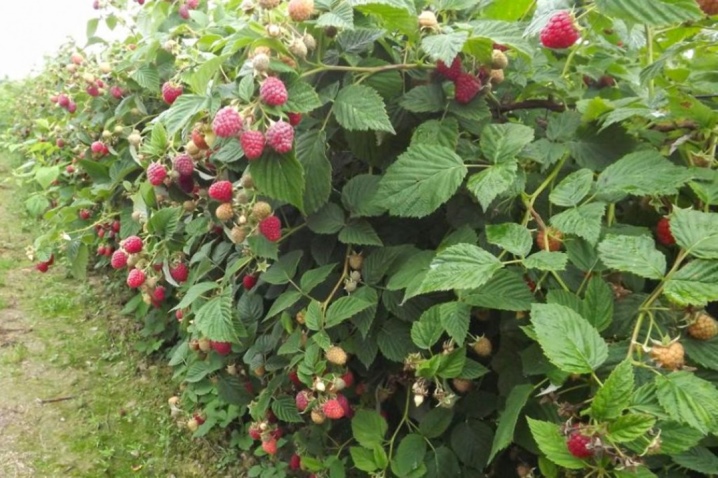
When is the best time to plant?
The first step is to choose the perfect time to plant your raspberries. Most often, the arrangement of the raspberry tree is done in autumn or spring. When choosing the optimal time for planting, you should focus on the features of the local climate.
In colder regions, raspberries are usually planted in the spring. The optimal time for such work is from mid-April to the second half of May. It is very important to have time to equip the raspberry plant before the buds begin to bloom on the shoots. Raspberries planted in spring will have time to take root well and get stronger. Therefore, it will be much easier for her to survive the cold.
In the central regions, raspberries are usually planted in the fall. Procedures can be performed from late August to mid-October. The main thing is that at least 30-35 days remain before the onset of frost.
It is not customary to plant raspberries in the summer. After all, at this time the weather is too dry. Therefore, plants will constantly lack moisture for growth and normal development.
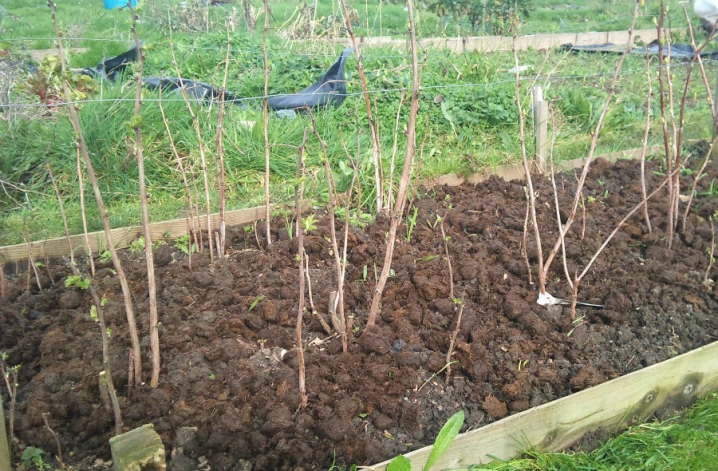
Sapling selection
An equally important role is played by the choice of a seedling. It is best to buy it in a proven nursery. In this case, the gardener will be confident in the quality of the selected plant.
The seedling must be strong and healthy. Its optimal height is 20-40 centimeters. There should be no cracks or any other mechanical damage on the barrel. During the examination, special attention should be paid to the root collar. The rudiments of new shoots should be located next to it. This is a sign that the plant will quickly take root and grow.
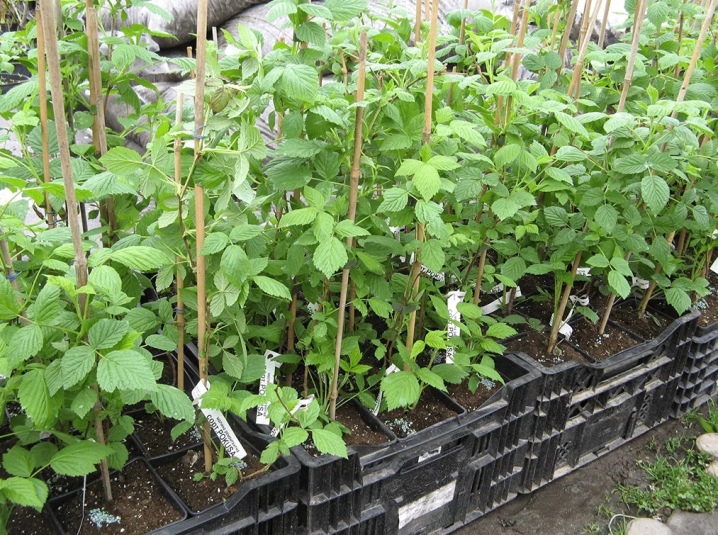
When examining a seedling, you need to pay attention to its rhizome. A young plant should have 2-3 roots. It is important that they are strong and intact. For planting on your site, you should choose plants with a bare trunk. Shrubs with more foliage develop more slowly because they lack nutrients.
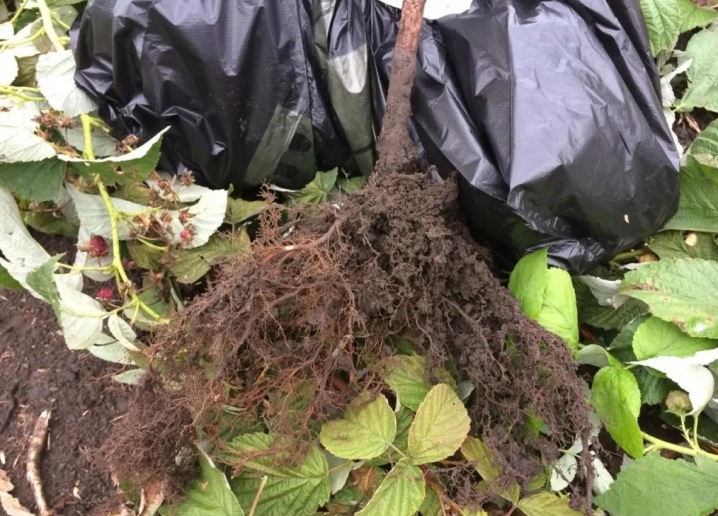
Where can you plant?
Having chosen the right seedling, attention should be paid to finding the perfect place to plant the plant. You need to pay attention to the following points.
- Illumination. Raspberry is a light-loving plant. Therefore, it is important that the raspberry tree is well lit. If the bushes grow in the shade, the shoots will quickly stretch out, and the raspberry yield will be significantly reduced.
- Soil composition. Garden raspberries grow well in soil with any composition. But most of all she loves black soil and loam. The acidity of the soil also plays an important role. If it is increased, the site will need to be dug up. After that, wood ash can be added to it.
- Windproof. Most often, raspberry bushes are planted along the fence. In addition, they can be located next to various buildings. In such a place, raspberries will be reliably protected from wind gusts. Therefore, do not worry about the stems breaking during a thunderstorm.
- Plants are neighbors. An important role is played by the next to which plants the raspberry bushes will be. If possible, the raspberry tree should be placed at a short distance from the garden and beds. But if the site is small, you will have to take care of choosing the right neighbors for the raspberry bushes in advance.They definitely should not be planted next to strawberries and strawberries. This can lead to the fact that the plants will be constantly sick and suffer from pest attacks. Many gardeners prefer to plant raspberries and currants together. Very often, several different varieties of these plants are grown on the site at once. They get along well with each other.
If the site meets all these requirements, raspberries will develop well on it.
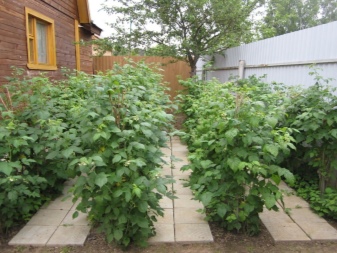
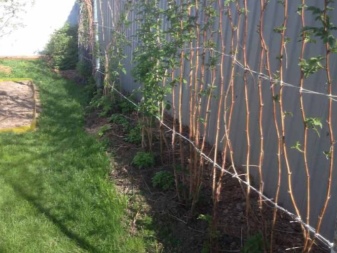
Preparation
Having decided on the location of the future raspberry tree, you can start preparing the site. The first step is to clear the entire area of old foliage and various garden debris.
Then you can start preparing pits or trenches. They must be dug up in the fall. The average depth of the holes is 35 centimeters. If you make them deeper, it will be difficult for plants to take root and grow. Bushes planted in shallow holes quickly begin to dry out. The diameter of the holes should correspond to the size of the rhizome. This is very important, because if the pits are too small, the roots can break off when planting.
To accelerate the growth of bushes, as well as increase their yield, high-quality fertilizers must be put in the holes. To increase soil fertility, potash and phosphorus fertilizers are used. When planting remontant gardens of raspberries, twice as much fertilizer is placed in the pit.
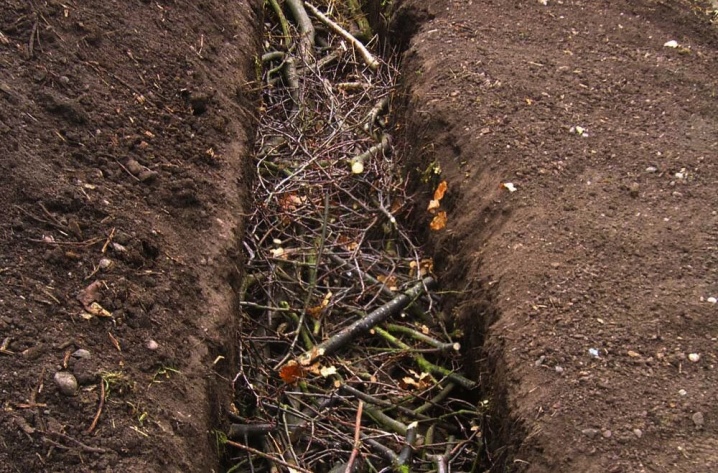
In the spring, the soil will need to be carefully loosened. Only after that you can start planting seedlings. For autumn planting, you need to prepare the site, and then wait 3-4 weeks. After that, you can start processing the plants.
To accelerate the growth of raspberries, its roots must be treated with a special solution. You can buy it at specialized stores. It is very important to keep the proportions. The roots should be slightly trimmed before processing. The next day after preparing the raspberries, you can start planting them.
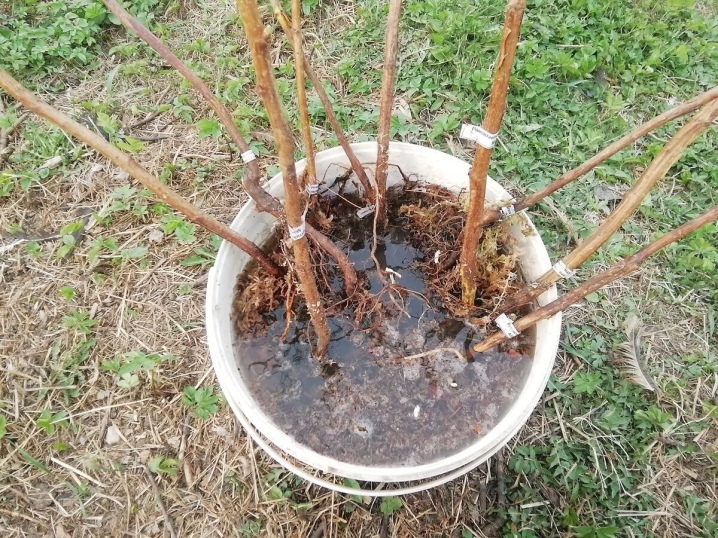
The ways
Now there are several ways to plant raspberries in open ground. Each of them has its own characteristics.
Bush
This planting method is most popular with most gardeners. It's pretty simple and doesn't require any effort. In addition, a plot designed in this way looks beautiful and natural. Pits for planting raspberries are located at a distance of 60-70 centimeters. There should also be enough free space between the rows. In this case, it will be much easier to care for the site and collect ripe fruits.
The required amount of fertilizer must be added to each pit. Next, they must be covered with a layer of fertile soil. After a couple of weeks, young raspberry bushes can be planted in the holes prepared in this way. When planting bushes according to Sobolev, small posts must be installed next to the pits. At a height of 40-45 centimeters, you need to pull on a strong railing. The planted shoots are attached to them. After planting the plants, the bushes must be covered with fertile soil, and then watered abundantly.
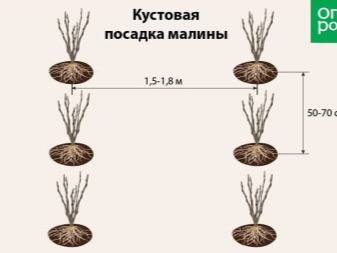
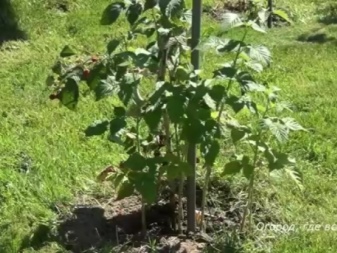
Private
This method of planting raspberries is also called trench or ribbon planting. It is suitable for large areas. The bushes that have been planted in the trenches are very easy to care for. In addition, they can be fertilized evenly. Thanks to this, the yield of raspberries is increased.
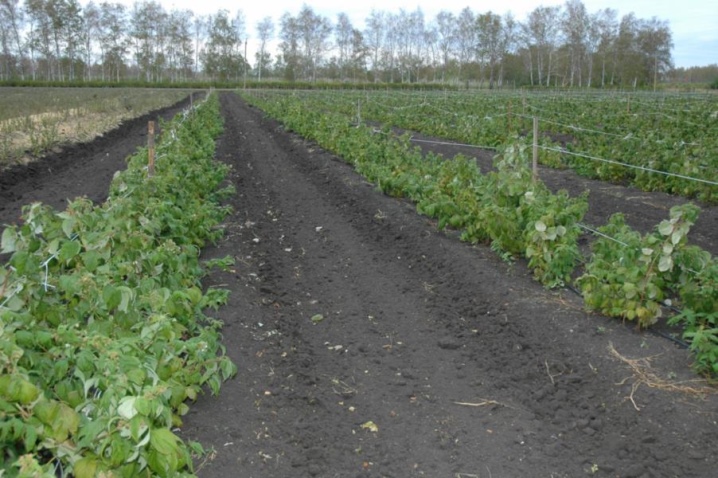
The process of planting raspberries in a trench is as follows.
- To begin with, the selected area must be marked by driving pegs along its perimeter. Do not use too high mounts. Future rows should be located at a distance of one and a half meters from each other.
- Strong cords are attached to the pegs. After that, long trenches are dug next to them.
- A drainage layer is laid at the bottom. Then you can fertilize the area. It is not only chemical fertilizers that can be applied to the soil. It will be helpful to feed the raspberries with organic foods. Compost is best suited for this purpose.
- The fertilizer layer should be covered with fertile soil.
- After a while, you can start planting seedlings. They are placed at a distance of about 50 centimeters from each other.
- After that, the plants are sprinkled with fertile soil and watered abundantly.
Because raspberries reproduce very quickly, it is important to avoid overgrowth. To do this, a few centimeters from the edges of the trenches, it is necessary to bury sheets of iron or unnecessary slate in the ground.
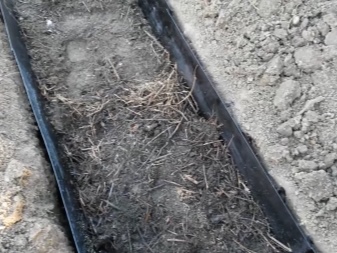
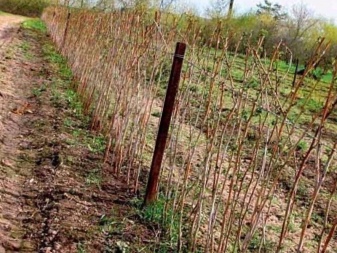
Other
In addition to the most common methods of planting raspberries, there are others. Many gardeners like to plant raspberries in tires or bottomless containers. These planting methods have both pros and cons.
Planting raspberries in a container without a bottom has a lot in common with the bush method of growing raspberries. The difference is that unnecessary plastic or metal barrels are buried in the holes. They must first cut off the bottom. After that, the container must be buried in the ground, and then the soil must be fed with a mixture of manure and earth. The plants are then grown in the usual way. The use of such containers also prevents the plant from spreading quickly throughout the site.
Raspberries are planted in tires in the same way. Some unnecessary tires may be located above the ground. Raspberries that have been planted in tires are always well protected from weeds. In addition, the soil retains water better.
You can also grow raspberries on logs. The landing method will be the same. The difference is that the logs need to be dug up from time to time and replaced with others, because they start to rot very quickly.
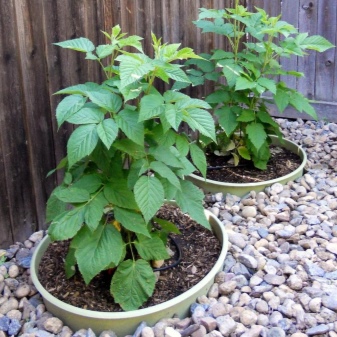
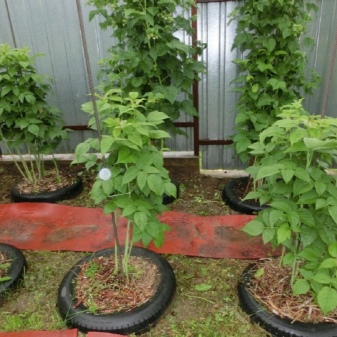
Landing technology
There are also several methods of breeding raspberries. For planting, you can use cuttings, shoots or seedlings grown from seeds.
Cuttings
Most often, cuttings are used for planting. In order for them to take root well, they must be properly prepared. Cuttings are usually cut from bushes in the second half of June. Only strong and healthy shoots should be chosen. For plant roots to develop faster, the crown bud must be removed immediately. The resulting stalk must be divided into several parts. Each of them should have two or three internodes. After this treatment, the cutting is recommended to be placed in a container with a solution that stimulates root development for a day.
Next, the seedlings must be placed in a container with sand and peat. From above it must be covered with a transparent cap or glass. After a couple of weeks, shoots will begin to form on the cuttings. At this stage of their development, the shelter can be removed.
Young plants can be rooted both in the greenhouse and in the open field. The seedlings will be ready for planting in a permanent place of growth in the spring.
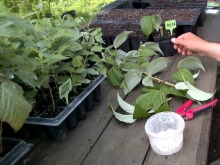

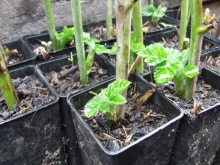
Shoots
In almost every area with raspberries, you can find a large amount of growth. Gardeners can use the strongest shoots to propagate raspberry bushes.
You can dig them out of the soil and replant them to a new place after the shoot is old enough and strong. Its height should be within 30 centimeters. The shoot dug out and separated from the main bush must be carefully trimmed. All lower leaves must also be removed from the plant.
Next, you need to fill the hole with high-quality fertilizers, and then place the shoot there. The hole should not be too deep. Shoots placed in a new place must be covered with nutritious soil, and then watered abundantly. Next, you need to gently pull the bush up. He shouldn't move.
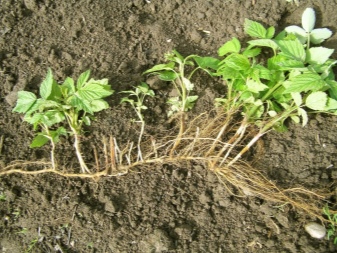
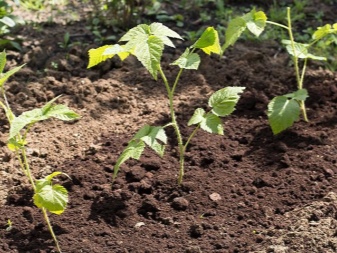
Seeds
You can also grow young raspberry seedlings from seeds. This process is quite complex. Besides, thus, it is far from always possible to grow an ideal and well-bearing plant.
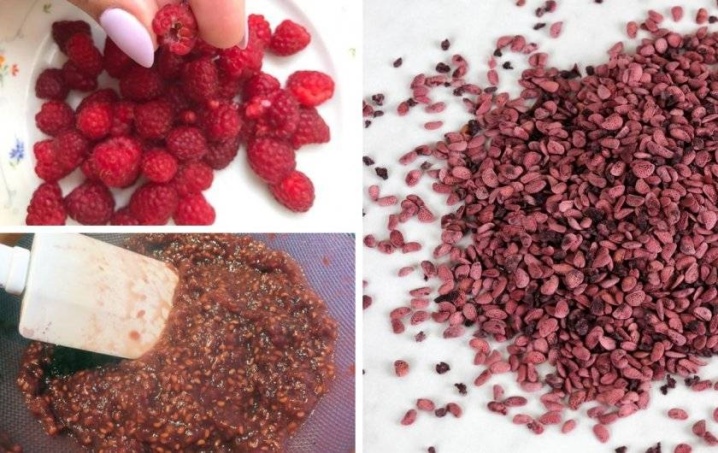
To prepare seeds for planting is as follows.
- First, they must be mixed with sand. The ratio should be 1 to 5. The mixture should be placed in small gauze or nylon bags. They are placed in a box and then shifted with moss. Further, these containers are placed in a cellar or any other cool place.
- The condition of the seeds should be checked from time to time. The soil needs to be slightly loosened and moistened.
- After 4-6 months, the seeds must be removed from the bags. They must be sown in prepared containers with fertile soil mixed with peat and river sand.
- The finished crops are covered with foil or glass. The seed container is sent to a warm and well-lit place. It is important that it is not exposed to direct sunlight. Otherwise, the seeds may overheat and die.
- The seed germination time depends on the raspberry variety. Therefore, the gardener just needs to carefully observe the sprouts. Once every few days, the container must be ventilated, and also inspected for mold.
- After half of the sprouts appear, they can be planted in separate pots. As soon as 2-3 leaves appear on the seedlings, they must be dived.
- Plant young plants in the ground it will be possible only in a year.
If you do everything right, self-grown seedlings will take root very quickly.
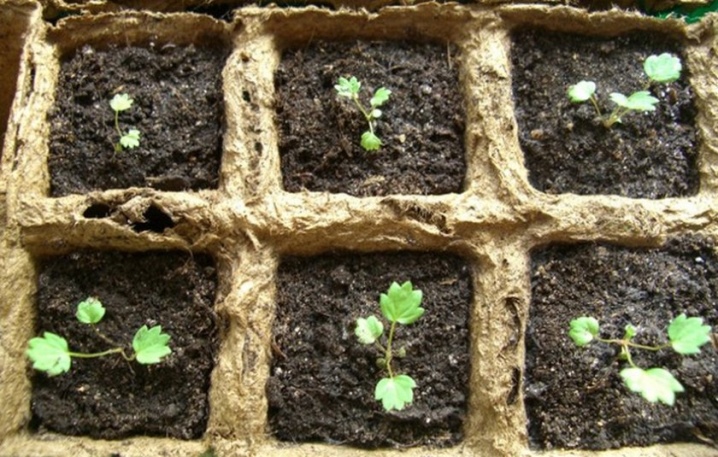
Follow-up care
After planting in open ground, raspberries need special care. The gardener needs to regularly carry out the following activities.
- Watering. In the first months after planting, young raspberries need regular watering. Water must be poured not directly under the root, but along the rows or into specially made grooves. A bucket of water is usually poured under one bush. Water the raspberries no more than twice a week.
- Mulching. To retain moisture in the soil, as well as protect the plants from weeds, they must be covered with a layer of mulch. This can be done using dry straw, foliage, sawdust, or compost.
- Protection from pests and diseases. In order for plants to develop well, they must be regularly treated with special preparations. Timely prevention helps protect the raspberry tree from diseases and pests. If the plants were nevertheless infected, the diseased bushes should be removed from the site.
- Pruning. Repaired raspberry varieties need regular pruning. Usually this procedure is carried out as early as the next year after planting the bushes. It is best to prune plants after the end of fruiting. At this time, it is necessary to remove all weak, old and drying out shoots.
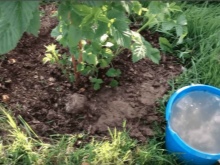
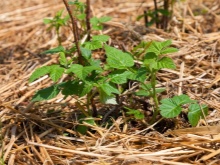
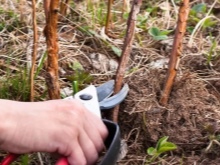
Planting raspberries on your site, as well as caring for them, is quite simple. Therefore, this plant is ideal for gardeners who are just starting to equip their garden.













The comment was sent successfully.